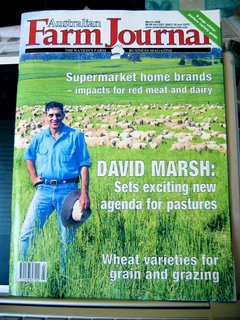 If the soil organic matter level in pastures in the Central West and Lachlan Catchments of NSW increased only 1% in the next 10 years, then 100 million tonnes of carbon would be sequestered, David Marsh told Australian Farm Journal. It would cost $20 billion to establish forests in drier regions to achieve the same effect. With cropping taking only 10% to 15% of agricultural land space in Australia, pastureland can have the greatest impact on terrestrial carbon management than any other land use, he says.
If the soil organic matter level in pastures in the Central West and Lachlan Catchments of NSW increased only 1% in the next 10 years, then 100 million tonnes of carbon would be sequestered, David Marsh told Australian Farm Journal. It would cost $20 billion to establish forests in drier regions to achieve the same effect. With cropping taking only 10% to 15% of agricultural land space in Australia, pastureland can have the greatest impact on terrestrial carbon management than any other land use, he says.David is a hero of the new agricultural revolution. Both Commonwealth and State Governments look to farmers like David to solve their biggest natural resource management problems: the degradation of our soils and the poor health of our water systems. Conservation farmers have shown there is profit in practices that preserve and regenerate natural systems. David Marsh had no shortage of feed on the ground and made a profit in each of the three years of the drought just passed. His secret? He switched from the traditional high production philosophy of agriculture in 1999 to the high profit model by shifting out of high input/maximum stocking management into holistic decision making. In short, David and Mary Marsh try to match their livestock numbers to the carrying capacity of the landscape in each season, never baring out the soil, always retaining ground cover to protect the soil structure. Under this system, David's 813 hectare property 'Allendale' near Boorowa, NSW, moved from 30% bare soil in 2002 to zero in 2003 and 2004 while levels of litter increased. (Litter encourages the growth of humis and the retention of water.)
"The high input, high production model of agriculture would seem to many to be the crowning glory of the triumph of humanity over nature," he told AFJ. But decisions made only with economics in mind have ignored the cost to ecosystems and only put off the day when that bill will have to be paid.
David Marsh is a member of the Council of the Carbon Coalition.





No comments:
Post a Comment